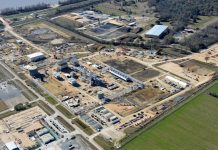Jim Lane
![logo[2].png](http://www.altenergystocks.com/wp-content/uploads/2017/08/logo_2_.png) KiOR, Inc. is a next-generation renewable fuels company that has developed a proprietary technology platform to convert sustainable non-food biomass into cellulosic gasoline, diesel and fuel oil. Using standard refinery equipment, KiOR’s products are compatible with the existing fuel infrastructure. KiOR strives to ease dependence on foreign oil, reduce lifecycle greenhouse gas emissions and create high-quality jobs and economic benefit across rural communities.
KiOR, Inc. is a next-generation renewable fuels company that has developed a proprietary technology platform to convert sustainable non-food biomass into cellulosic gasoline, diesel and fuel oil. Using standard refinery equipment, KiOR’s products are compatible with the existing fuel infrastructure. KiOR strives to ease dependence on foreign oil, reduce lifecycle greenhouse gas emissions and create high-quality jobs and economic benefit across rural communities.
Address:
13001 Bay Park Road, Pasadena, TX 77507
Year founded: 2007
Stock: Nasdaq: KIOR.
As of 8/31/12 Khosla Ventures, Artis Capital, Alberta Investment Management Corporation and other major direct and institutional holders were major investors in KiOR.
3 Top Milestones for 2009 – 2012:
1. Development and commercialization of the Company’s proprietary biomass-to-cellulosic fuels technology.
2. Acquire funding for the Company’s capital and operating requirements through the public and private capital markets.
3. Development, construction, commissioning and operation of the Columbus, Mississippi facility, KiOR’s first commercial scale cellulosic fuel production facility.
3 Major Milestone Goals for 2013 – 2015
1. Full ramp up of Columbus facility
2. Development and construction of KiOR’s first commercial cluster of production facilities, consisting of four standard conversion facilities (three times larger than the Columbus facilities) and two upgrading facilities for production of cellulosic gasoline and diesel
3. Continued research and development on KiOR’s proprietary biomass-to-cellulosic fuels technology platform to reach targeted yield and throughput goals
Business Model:
Owner-operator and “value share” joint venture participant
Competitive Edge(s):
1. Breakthrough technology based on well-established refining processes.
2. World’s first “drop in” cellulosic hydrocarbon gasoline and diesel (as opposed to ethanol or biodiesel) producible at commercial scale.
3. Cellulosic fuel that can be cost-competitive with traditional fossil fuels but with 80% reduction in lifecycle greenhouse gas emissions than fossil fuels.
4. Feedstock flexibility on all types of sustainable, non-food biomass.
5. Enhances energy independence and increases energy security.
6. Significant economic benefits for rural communities.
Research, or Manufacturing Partnerships or Alliances.
None
Stage: Commercial
Company website: http://www.kior.com/
Disclosure: None.
Jim Lane is editor and publisher of Biofuels Digest where this article was originally published. Biofuels Digest is the most widely read Biofuels daily read by 14,000+ organizations. Subscribe here.








